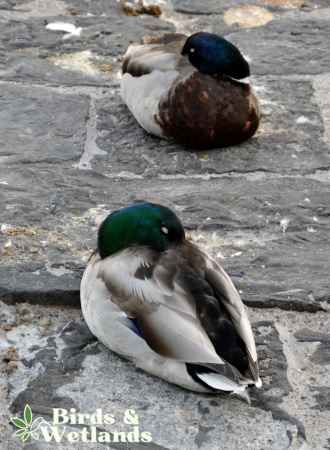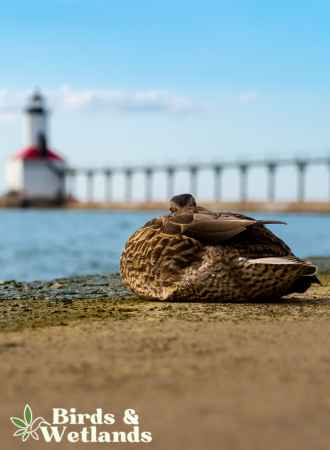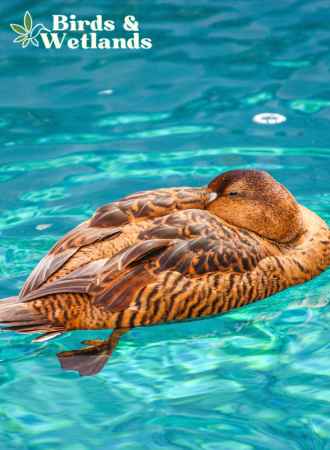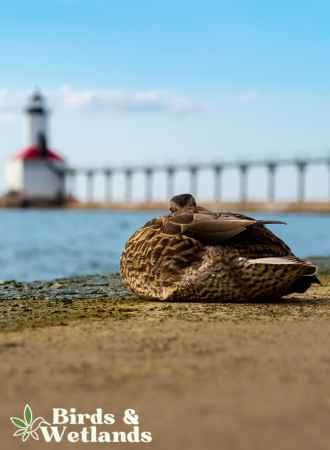Ducks are some of the most adaptable creatures on Earth. They can be found in almost any environment. It’s not uncommon for migratory ducks in North America to winter in the arid climes of Nevada and Arizona provided they have enough water and food.
But Where do Ducks Sleep?
Ducks typically sleep wherever they feel safe from predators, which could be in the water, on land, or even in trees depending on the species. They often sleep in groups, with ducks on the periphery keeping one eye open for potential threats.
This unique ability, known as unihemispheric slow-wave sleep, allows one half of the brain to sleep while the other half remains alert. Ducks also sleep in short periods throughout the day and night, rather than in one long stretch.
Key Takeaways on Ducks’ Sleeping Habits
- Ducks spend a lot of time resting during the day, and they may do so in the water or on land.
- When ducks sleep, they can do so with one leg up, sleep with one eye or with only half of their brains active.
- Ducks are capable of reacting to predator warnings in less than a fifth of a second which is truly impressive. And the ability to sleep with one eye open is a crucial ability for their survival.
How Do Ducks Sleep?

One of the things that make ducks so unique is the way they sleep. Unlike humans, who tend to sleep for long periods of time at night, ducks sleep in intervals. They’ll take short naps throughout the day, sometimes taking a dip in water to keep themselves cool.
Because they’re always on the lookout for predators, ducks have evolved to be able to sleep with one eye open. This is known as unihemispheric sleep, and it allows ducks to keep half of their brains awake while the other half sleeps. Ducks are able to get the rest they need without putting themselves at risk.
Various Sleeping Postures

Ducks have some unique habits when it comes to sleeping. Depending on where they are when they go to sleep, ducks will adopt different positions. But most ducks sleep with their head resting on their body.
For instance, Muscovy ducks sleep in a normal posture. They rest their heads on their bodies. Baby ducks or young ducklings sleep close to their parents to get the external body heat they need.
If a duck is sleeping in water, it will usually rest its head on its chest or turn its head back so that it is resting on its back. However, when ducks sleep on land, they typically stand on one leg.
This helps them to conserve body heat and helps keep ducks stay warm during cold temperatures by reducing heat loss through the bare legs. As only one leg is exposed to the cold air while the other leg is protected by the duck’s feathers.
Unihemispheric Slow-Wave Sleep
Unihemispheric slow-wave sleep (USWS) is a state of sleep in which only one-half of the brain sleeps at a time. This allows the other half to remain awake and vigilant, while still benefiting from the restorative effects of sleep.
Unihemispheric sleeping occurs in many aquatic birds, who have a very specialized connection between their brains and respiratory systems. Single hemisphere sleeping allows for continued oxygenation of blood in one hemisphere when sleeping.
USWS occurs in a variety of animals, but it is particularly well-developed in ducks and other birds that spend a lot of time in the water. This sleeping ability allows them to keep one eye open. Ducks tend to sleep this way since they are prey birds.
When ducks leave half of their brain awake, they need can keep one eye open to watch for predators or other threats. So, a duck sleeping with one eye open is not that uncommon.
USWS also provides a number of other benefits. For example, it helps to reduce the ducks’ body temperature, which is important for regulating their metabolism.
Where Do Ducks Sleep?

Ducks are semi-nocturnal creatures, and they have a variety of different sleeping habits. Some ducks prefer to sleep in the water, while other ducks prefer to sleep on land. Other ducks such as Mallard ducks can sleep both on land and in the water.
Most ducks like the Mallard duck are so comfortable in water that they often sleep or rest in it. There are several reasons why water is the most natural place for ducks to sleep or rest. Ducks and other waterfowl are less likely to be attacked by avian predators when they sleep floating in the water.
The water helps to keep ducks cool in hot weather. They’re not affected by the cold during the night, thanks to their body fat and feathers. While many ducks sleep in the water, no duck species sleep underwater, not even diving ducks or sea ducks.
If you have domestic ducks, don’t worry. You don’t need a pond but domesticated ducks will enjoy a swim in a kiddie pool. However, you should still provide them a safe sleeping space for nighttime sleeping. They can sleep on soft straw or wood shavings. A duck’s feathers provide warmth so make sure farm ducks also have proper ventilation so that these farm animals can have a good night’s sleep.
Some wild ducks often sleep on land, especially during the cold winter nights when they need warm sheltered habitats. It is necessary for them to seek shelter given the extreme environmental factors.
When sleeping on land, ducks build their own nests and will stand on one leg. This helps to protect the duck’s legs from the cold temperature and also helps to preserve heat during cold weather conditions.
As a result, the duck is able to save energy and stay warm throughout the night. Though it may seem strange, this behavior is actually quite practical and allows ducks to thrive in both aquatic and terrestrial environments.
Can Ducks Sleep and Swim at the Same Time?

Ever wonder if ducks can swim and sleep at the same time? The answer is yes! Ducks are able to unihemispheric sleep, which means that they can keep one half of their brain awake while the other half sleeps. This allows them to keep swimming even while they sleep floating.
When Do Wild Ducks Sleep?

So, what is a duck’s sleeping schedule? A duck’s sleeping habits may come as a surprise to many people. Unlike humans, who generally sleep for one continuous stretch each night, ducks take many small naps throughout the day. This behavior, known as intermittent resting, allows them to conserve energy and stay alert for predators.
Woodlink Cedar Duck Nesting Box
Attract ducks to your wetland area and provide them with a cozy, secure nesting space using the expertly crafted Woodlink Cedar Duck House, made with high-quality materials in the USA.

Pros
- Ornithologically designed: This nesting box is specifically created for ducks, ensuring an optimal environment for them to thrive.
- High-quality materials: Made from re-forested, kiln-dried, inland red cedar, the Woodlink Cedar Duck House is both durable and eco-friendly.
- Easy to install: The nesting box comes fully assembled, with screws included for quick and easy mounting.
- Made in the USA: Take pride in knowing that you are supporting a product that is made domestically, ensuring top-notch quality and craftsmanship.
- Versatile use: While designed specifically for ducks, this nesting box can also be occupied by other species like screech owls, squirrels, and pileated woodpeckers.
Cons
- Mounting height: Users must research and choose the appropriate mounting height (usually 4-6 feet above the ground) and install a baffle on the post to deter predators like raccoons and cats.
- Limited viewing access: Although the front of the box can be opened for viewing, it is important not to disturb nesting birds, which may limit opportunities for observation.
Ducks also have the ability to sleep both during the day and night, depending on their needs. For example, if they are migrating or nesting, they will often switch to a nocturnal sleep schedule in order to save energy and avoid detection. In short, ducks have unique sleeping habits that allow them to adapt to their environment and better survive in the wild.
FAQs on Ducks’ Sleeping Pattern
What Do Ducks Do at Night?
As the night falls, wild ducks begin to wind down for the night. They often sleep in a group setting and may preen their feathers or take a swim, but eventually, they’ll settle in for a few hours of sleep.
However, ducks don’t spend all their nights sleeping. They are semi-nocturnal, meaning they are active at night, although not to the same extent as they are during the day.
Ducks socialize and migrate at night, and many of their activities depend on the weather. For example, on a cold night, ducks will huddle together to keep warm. On a hot night, they may take a cooling dip in a pond or lake.
Young ducks spend more time awake than older ducks do because young ducks are still energetic. But even older ducks don’t sleep all night. They may sleep for a few hours at a time, but then they’ll be up and about again, enjoying the quiet of the night.
Do Ducks Sleep in a Row?

It’s a common question, and the answer is both yes and no. Some ducks tend to sleep in a row, but not all of them do. When ducks fall asleep in a row, the ducks on either end of the sleeping row are typically on guard duty.
The birds holding each end of the row sleep lightly and remain alert. Guard ducks are the first to spot any predators or threats, and the male ducks sound the alarm to wake up the rest of the flock.


